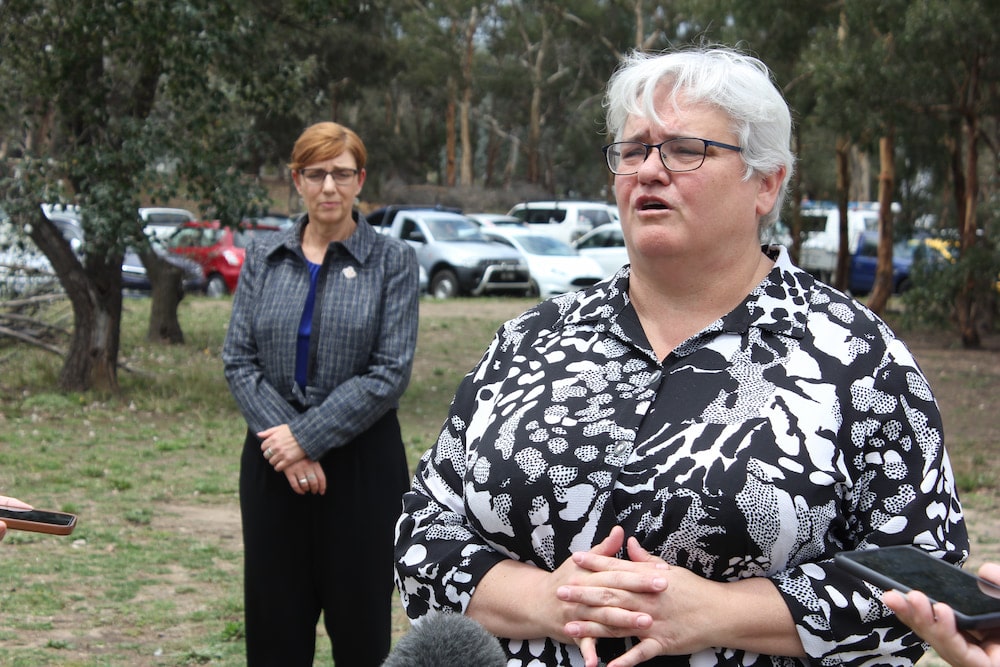Self-determination for Indigenous people could result from this year’s ACT Government’s budget. Aboriginal and Torres Strait Islander peoples in Canberra will administer more than $7 million in partnership with the ACT Government, on priorities they themselves have identified.
“This is self-determination in action,” Katrina Fanning, chair of the ACT Indigenous Elected Body, believes. “No longer just being advisory groups or providing some advice to how things are going to be run – but backing our solutions, our people, to make a difference in our communities.”
Dr Emma Campbell, CEO of the ACT Council of Social Service (ACTCOSS), welcomed the funding announcement, but thought it was long overdue.
Towards a Treaty
The ACT Government has promised to set up a 10-year, $20 million Healing and Reconciliation Fund to Close the Gap; $317,000 this year will establish the governance structure and administration processes.
The Fund is intended to lead to a Treaty between the Ngunnawal people and the ACT Government; part of the sum will begin the process, Rachel Stephen-Smith, Minister for Aboriginal and Torres Strait Islander Affairs, said.
Ngunnawal Elders recently visited Victoria to see what the Treaty process looked like there – an opportunity, Ms Fanning said, to take from that what met their needs and to identify aspects that were different and unique.
Dr Campbell said: “Given the significant amount of work that needs to be done to improve outcomes for Aboriginal and Torres Strait Islander peoples in the ACT, we hope that the establishment of this fund marks the beginning of serious investment in the policies and changes that Canberra’s First Nations communities and organisations have long been calling for.”
Aboriginal-controlled services
$425,000 will help the Gugan Gulwan Youth Aboriginal Corporation design a new building in Wanniassa and submit a development application. The youth organisation has helped local Indigenous people since 1992, providing culturally specific and safe programs and services.
$4.9 million will be used to implement the recommendations of the Our Booris, Our Way review into over-representation of Indigenous children and their families in the child protection system.
“Some of the recommendations are nearly three years old and have still not been implemented,” Dr Campbell said.
In 2019–20, Dr Campbell noted, the rate of Aboriginal and Torres Strait Islander children in care in the ACT was 14 times higher than the rate for non-Indigenous children – an improvement on 2017–18, when they were 16.3 times more likely to be in care.
“We’ve heard loud and clear from the Aboriginal and Torres Strait Islander community that addressing this unacceptable rate of over-representation is an absolute priority,” Ms Stephen-Smith said.
The ACT also has some of the lowest levels of spending on family and child supports of any jurisdiction in Australia, according to data from the Productivity Commission Report on Government Services, Dr Campbell said.
The ACT spent $802.16 per child aged 0 – 17 in the population on intervention, care, intensive family support, and family support – the lowest of any jurisdiction, Dr Campbell noted. The ACT also had the third lowest jurisdictional spending on intensive family support services per child in the population, and the second lowest jurisdictional spending on family support services per child in the population. The ACT also spent the least amount per placement per night in care services: $176.51, well under the Australian average of $210.62.
“That might be efficiency, but it also points to the fact that community services in the ACT that provide child and family services are woefully underfunded,” Dr Campbell said.
The budget will allocate a further $1.6 million to be spent on Indigenous housing, child protection and domestic violence support.
The Government promised to embed the Child Placement Principle that Aboriginal and Torres Strait Islander people have the knowledge and experience to make the best decisions concerning their children, and that children should stay connected to their family, community, culture and country.
The Government also promised to improve frontline services; build cultural expertise in child and youth protection services; and establish Aboriginal community-controlled child and family services, as well as in justice, housing and disability.
“Aboriginal community-controlled services are what we need to make change to Close the Gap,” Ms Stephen-Smith said. “Aboriginal and Torres Strait Islander people have the answers. They know how to work with their community.”
But Dr Campbell was cautious. “We are yet to see details of exactly how this money will be spent. It is important that priority is given to investment in front-line services, in particular Aboriginal community-controlled organisations. It must not be spent on unnecessary administration and bureaucracy.”
The Government would also like to establish a Ngunnawal Language Centre, and return Boonamulla Oval and Yarramundi Community Centre to Indigenous control.
The ACT, Minister Stephen-Smith said, was leading the way on many Indigenous issues. It was the first jurisdiction both to have an Elected Body as a voice to government and parliament, and to make Reconciliation Day a public holiday. It was also one of the first jurisdictions to sign the National Agreement on Closing the Gap.
Ms Fanning welcomed the budget proclamations. “It’s no accident that children and young people are central to every one of these announcements. More than half of our community are under 24, and each of these announcements … gives them an opportunity to not just survive in this community, but to absolutely thrive.”
For more news:



